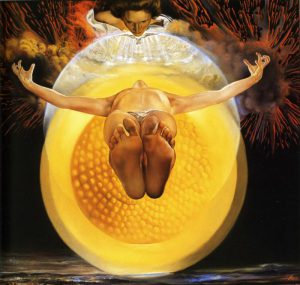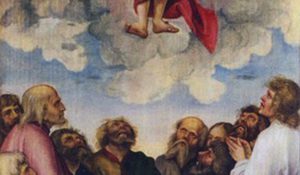What makes Ascension Day so important?
 What would you identify as the climax and completion of Jesus' life and ministry? Surprisingly, this is not a trivial question. I of the key differences between John and the synoptic gospels is that, where the synoptics portray the crucifixion as a necessary but incomplete act on the mode to the resurrection, John portrays it as the climax and completion of Jesus' ministry building in itself. In place of Jesus' weep of despair (Matthew 27.46, Mark fifteen.34), John records a cry of triumph 'Information technology is finished!' (John xix.30). The promise of 'living water' springing from the belly or side of the one who believed (John vii.38), all-time understood in reference to the Temple prophecy in Ezekiel 47, is fulfilled in the blood and water from Jesus' side at his death (John 19.34). No wonder the true testimony of this leads to organized religion (John xix.35).
What would you identify as the climax and completion of Jesus' life and ministry? Surprisingly, this is not a trivial question. I of the key differences between John and the synoptic gospels is that, where the synoptics portray the crucifixion as a necessary but incomplete act on the mode to the resurrection, John portrays it as the climax and completion of Jesus' ministry building in itself. In place of Jesus' weep of despair (Matthew 27.46, Mark fifteen.34), John records a cry of triumph 'Information technology is finished!' (John xix.30). The promise of 'living water' springing from the belly or side of the one who believed (John vii.38), all-time understood in reference to the Temple prophecy in Ezekiel 47, is fulfilled in the blood and water from Jesus' side at his death (John 19.34). No wonder the true testimony of this leads to organized religion (John xix.35).
But most of the NT would point to the resurrection as the completion. Paul's theological linking of Jesus' decease and resurrection to our move into and out of the water of baptism (Romans six.3–4) suggests that crucifixion and resurrection belong together, and this is evident all through the announcement of what God has washed. This Jesus, whom you crucified, God raised from the expressionless, Peter tells the Pentecost crowd in Acts ii, and we are witnesses of this. Paul, in Luke's parallel delineation of his ministry, too talks of 'Jesus and the resurrection (anastasis)' (Acts 17.eighteen), so much and then that his hearers think that Anastasis is the female consort goddess to the male god Jesus. Paul'southward summary of the gospel for the Corinthians is that 'Christ died for our sins…was buried…and was raised on the third day' (1 Cor 15.3–four).
Even so most of the New Testament really sees a third motility as an essential role and completion of Jesus' work: the Rising. We might miss this because of our theological tradition, but we often miss it because of our failure to read advisedly. In Peter's Pentecost speech, the climax of what God has done in Jesus is not the resurrection, but Jesus being 'exalted to the right hand of God' (Acts 2.33). In support of this, he cites Ps 110, the nearly cited psalm in the NT, with its imagery of 'the Lord' (messiah) taking his seat at the right hand of 'the Lord' (Yahweh, the God of Israel).
We tin can come across how important this is, even in Paul's theology. In his great hymn in Philippians ii (I am not convinced Paul is citing a pre-existing composition), he actually skips over the resurrection and moves direct from Jesus' 'death on the cross' to his being 'exalted to the highest place' (Phil two.8–9). It is as if the movement from expiry to life to celebrity, in resurrection and rising, are i motion. In John, Jesus makes reference to this by the garden tomb, telling Mary not to hold on to him because he has non yet ascended, and, virtually intriguingly, the gospel message she is given for the disciples is 'I am ascending to the Father' (John 20.17). Luke divides his work into two not on the basis of the resurrection but at the point of the Ascension:
In my former book, Theophilus, I wrote virtually all that Jesus began to do and to teach until the day he was taken up to heaven… (Acts 1.1–2)
So why do we miss the importance of this? It largely comes downward to misunderstanding Daniel vii and its cribbing in the New Attestation.
In my vision at night I looked, and there before me was one like a son of man coming with the clouds of heaven. He approached the Aboriginal of Days and was led into his presence. He was given authorisation, glory and sovereign power; all nations and peoples of every language worshiped him. His rule is an everlasting rule that volition not pass away, and his kingdom is one that volition never be destroyed. (Daniel 7.13–14).
Although Jesus appropriates the language of 'one like a son of man' to refer to himself, in Daniel this is a corporate figure; just as the four beasts before in the chapter accept been personifications of the four great empires (Babylonian, Persian, Greek and Roman), this human figure is a personification of God'south own people, currently oppressed and persecuted by the powers that be, but trusting God who will rescue them, bring them into his presence, vindicate them and give them power and authorisation over those who currently accept power over them. A parallel to the visions in the start part of Daniel (the iv beasts correspond to the 4 parts of the statue in Daniel 2), information technology represents the inversion of power that Mary describes in the Magnificat—'you have scattered the proud in the imagination of their hearts' (Luke 1.51).
In taking up the title 'Son of Homo', Jesus is claiming to fulfil the destiny of State of israel—to take on their oppression, only also to feel the vindication from God. This also involves a crucial re-interpretation every bit well: it is not the empires of this globe that are the true oppressors of Israel, just the powers of darkness and their ain sin and disobedience. Thus when John the Baptist 'goes earlier the Lord to prepare his way' it is through 'the forgiveness of all their sins' (Luke one.77).
 But the key thing to notice in Daniel 7 is the phrase 'coming with the clouds of heaven'. This is associatednot with anyone's coming from heaven to earth, merely rather the opposite—the exultation of the Son of Man equally he comes from the earthto the one seated on the heavenly throne. This is language both singled-out from, and contrary to, Paul'south use of 'coming on the clouds' in 1 Thess four.17. This would have been very obvious to Paul's readers, since he uses quite different language for 'coming', the wordparousia meaning 'imperial presence'.
But the key thing to notice in Daniel 7 is the phrase 'coming with the clouds of heaven'. This is associatednot with anyone's coming from heaven to earth, merely rather the opposite—the exultation of the Son of Man equally he comes from the earthto the one seated on the heavenly throne. This is language both singled-out from, and contrary to, Paul'south use of 'coming on the clouds' in 1 Thess four.17. This would have been very obvious to Paul's readers, since he uses quite different language for 'coming', the wordparousia meaning 'imperial presence'.
Noticing this difference helps us unravel several fundamental texts in the gospels. In Mark's account of Jesus' trial, Jesus says to the Loftier Priest:
You will see the Son of Man sitting at the right manus of the Mighty 1 and coming on the clouds of heaven (Mark 14.62)
This cannot refer to Jesus' return to earth ('second coming') unless Jesus was deluded about how presently that would happen. But more importantly, it cannot hateful this because it is an almost verbal quotation from Daniel 7, and refers to Jesus' (the Son of Human'southward) ascending to the throne of God and fulfilling the destiny of Israel. That is why the High Priest considered information technology irreverence: in effect, Jesus was crucified considering he predictable his Ascension!
Similarly, Matt 24 makes no sense unless we read it in the light of Daniel 7. Jesus predicts that:
At that fourth dimension the sign of the Son of Man will appear in the sky, and all the peoples of the earth volition mourn. They volition see the Son of Human coming on the clouds of sky, with power and great celebrity… (Matt 24.xxx)
merely then goes on to say, quite solemnly, 'Truly I tell y'all, this generation volition certainly not pass away until all these things have happened' (Matt 24.34). Unless both Jesus and Matthew (and those collecting the catechism) were mistaken, this must have already happened—and information technology did, in the Rising. Jesus was defenseless up in the clouds of heaven to sit at the Father's right paw in celebrity.
 If the Ascension is and so of import in the NT, what does it hateful?
If the Ascension is and so of import in the NT, what does it hateful?
- Dominance. Jesus is enthroned with the Father. It is because of the Ascension that the lamb who was slain is seated with the 1 on the throne and shares his worship (Revelation four). It is in the Ascension that 'all authority has been given to me' (Matt 28.18). And this authorization ways that Stephen is confident that he is held by a higher ability, even to the point of decease—his last vision is of Jesus ascended in Daniel 7 terms (Acts vii.55–56)
- Humanity. In the incarnation, God entered into human being. In the Rising, that humanity is taken upwards into the presence of God. We have a High Priest interceding for usa who is non unable to sympathize with our challenges, dilemmas, suffering and weakness (Heb 4.15–16)
- Responsibility. The Rising marked the terminate of Jesus' earthly ministry; he has now given usa responsibleness to continue this work, empowered by the Holy Spirit. Jesus is not distant or indifferent, but he has delegated.
- Allegiance. Jesus ascending in the clouds to heaven promised that he volition return 'in the aforementioned way' (Acts i.11). His return is never chosen the 'second coming' in the NT, considering information technology is non paired with his 'start coming' (the Incarnation) merely with the Ascension. As God has put all things nether his feet, one twenty-four hours his potencyde jure will exist an say-sode facto.
(Previously published in May 2017.)
If y'all enjoyed this, do share it on social media, possibly using the buttons on the left. Follow me on Twitter @psephizo.Like my folio on Facebook.
Much of my work is washed on a freelance basis. If you have valued this post, would you considerdonating £one.20 a month to support the production of this web log?
If you enjoyed this, practice share it on social media (Facebook or Twitter) using the buttons on the left. Follow me on Twitter @psephizo. Like my page on Facebook.
Much of my work is washed on a freelance basis. If you have valued this mail, you can make a single or echo donation through PayPal:
Comments policy: Good comments that engage with the content of the post, and share in respectful debate, tin can add real value. Seek first to understand, then to exist understood. Brand the about charitable construal of the views of others and seek to learn from their perspectives. Don't view contend as a conflict to win; address the statement rather than tackling the person.
Source: https://www.psephizo.com/biblical-studies/what-makes-ascension-day-so-important/
0 Response to "What makes Ascension Day so important?"
Post a Comment